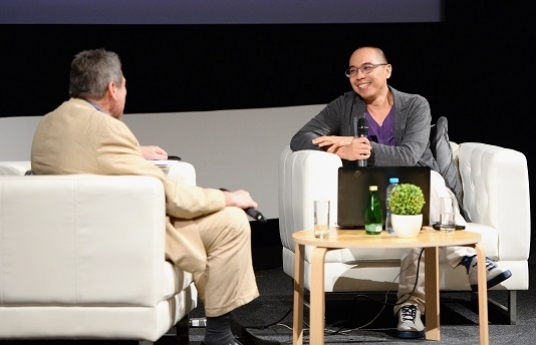Qumra Master Apichatpong Weerasethakul’s meditative masterclass inspires emerging talents on the power of borderless, timeless cinema
Mar 12, 2018

Doha, Qumra; March 12, 2018: In his masterclass at Qumra, the industry event by the Doha Film Institute, Cannes Palme d’Or winning Thai filmmaker and visual artist Apichatpong Weerasethakul presented a compelling notion before emerging filmmakers: The distant possibility of hooking up all the brains in the world to share their dreams. “We will no longer need cinema then,” he said, underpinning his own meditative approach to film as a medium that is after all, “evolved from dreams”.
Weerasethakul’s masterclass was anything but ordinary, as he took audiences on his very original journey in cinema, shaped by the collective memory of his own and his friends, and shaped from their many dreams. He connected dreams to movies, reminding audiences of the four cycles of the brain while one is at sleep, and concluding that “movies evolved from this”.
He said sleep is “like cinema but much better, as various scenarios from our memories play out.” For him, the art of making films is to exorcise these memories and lay them out bare. In today’s world, where message distortion and fake news thrive, his own interpretation of storytelling and history is that they are “devices to bluff memories and to manipulate them”.
But he was not dragging back audiences to symbolisms and abstraction: He was also pushing them forward, especially the young filmmakers that Qumra nurtures, to the limitless possibility of virtual reality, calling it a turning point for movies, ‘which does not confine you to frames”.
Weerasethakul was also vocal, in his own unique way, about the concerns that he sees as a filmmaker in Thailand’s contemporary political scene. At one point, he speculated how his own cinematic interpretations and visual installations could be perceived by the military authorities, and told about how several of his friends had their social media accounts monitored and were sent to camps “for attitude adjustment,” where they are “tortured psychologically”.
He also presented a captivating presentation on his journey, taking audiences through visuals of his hometown, the people and places that shaped his memories, and his cutting-edge installations that interpolate cinema, art, visuals and theatre, into something that is singularly mysterious.
Weerasethakul said he is not overtly concerned about whether his works would be understood for what he intended: “After a screening of my movie, one person got very angry and demanded a refund. I obliged. Over time, I have come to care less and less about such responses because what matters is how honest you are. If you believe in conventional cinema go for it but make it the best. You are your first audience and you must be truthful to yourself,” he told young filmmakers. Urging young talents not to be let down by criticism, he reminisced how his teacher had asked him to “go back to school and learn filmmaking” after watching his film.
Discussing his movies, including the Palme d’Or winning Uncle Boonmee Who Can Recall his Past Lives, Weerasethakul said his fascination for cinema was shaped by the works of Steven Spielberg (ET and Close Encounters of the Third Kind). “The way he deals with science fiction, and how he introduced a lot of smoke and backlighting”, fascinated the young boy.
He studied architecture because his hometown did not have a film school, but film remained his first love. “My films are linked to dreams, memories, experiences of loved ones around me,” said Weerasethakul, who added he prefers to work on cameras that only shoot in 2K but is forced now to go for 4K. He said he selects his actors by going out to the street with flyers, and often makes changes to the characters and their backgrounds in the films to suit the actors he chose. He also doesn’t seek out music for his movies, and whatever music that forms part of his films, come from the “memory of the shoot”.
For his untitled new film, he is working with mirrors, and is about a woman who can’t sleep. He uses paintings and visual art in addition to the mirror-effects and reflections to further define his own style of filmmaking that is not bounded by conventions.
He said meditating “about 20 minutes a day” awakes his heart to writing, for which he draws on several notes that he has made from memories. Weerasethakul said he doesn’t believe in “nationality in cinema” highlighting his own conviction in cinema as a being border-less – a fact not lost on young talents from 25 countries who are in Doha to be part of the next wave in cinema.
The fourth edition of Qumra brings together more than 150 acclaimed filmmakers, industry professionals and experts to nurture 34 films – the Qumra Projects – by first and second-time filmmakers that are in various stages of development. The six-day event is held through March 14, at Souq Waqif and the Museum of Islamic Art, and features Qumra Masterclasses, Qumra Talks and screenings in the Modern Masters and New Voices in Cinema segments.